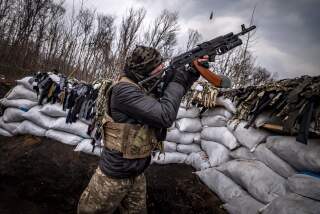LITHUANIA AN OLD PLOY : In a Pinch, Muscle Is ‘Presidential’ : American leaders have often used military operations as a diversion from domestic problems. Can it be that President Gorbachev has picked up this tactic as well?
- Share via
American Presidents have, on occasion, been known to seek diversions, distractions and detours to divert attention from domestic unhappiness or national drift.
Whether Grenada or Panama, Libya or Lebanon, there is nothing like a military operation to preoccupy the public mind and focus discourse away from intractable economic problems at home. Besides, issues involving national pride and strength lend themselves to the kind of right / wrong, black / white categories that please us all.
Little surprise, then, that the new Soviet president may have learned this lesson. Five years have passed since Mikhail S. Gorbachev became the Soviet leader and three historic corners have been turned: Democracy has taken root in the Soviet Union, Soviet foreign policy has become virtually benign and the Soviet standard of living has declined.
Gorbachev has now consolidated extraordinary executive authority in the new office of the presidency and he immediately used that authority to issue a Draconian economic reform package long called for by his more progressive critics. But this “cold shower” approach (so-called for the shock it is bound to cause) will surely also cause things to get worse for almost all Soviet citizens before they get better.
Largely because of the faltering Soviet economic system, Gorbachev’s popularity continues in a free fall. He chose not to submit his presidential candidacy to a popular referendum for fear of an embarrassing outcome. His economic woes are compounded by the anger of old Communist Party regulars at his sell-out in East-Central Europe, Afghanistan and Central America, and by increasing instability in the Soviet republics.
Now comes Lithuania. It declares its independence, throws down the gauntlet to Moscow and paves the way for other Baltic secessions from the Soviet Union. Gorbachev responds with a show of military strength. His enemies, including the Lithuanians, call him Stalin. His friends say he lost his composure and overreacted. Meanwhile, tensions mount.
But let us consider a third possibility--the possibility that Gorbachev may have been studying the American presidency closely enough to make us uncomfortable. Gorbachev may be escalating the Lithuanian crisis to divert Soviet attention away from the first harsh steps required to implement the new painful economic reforms. Is this dangerous? Potentially. Is it kosher? Certainly not. Is this the way superpowers behave? Too often.
If this third scenario were true, it might explain what otherwise is uncharacteristic behavior by Gorbachev. Up to now the use of force or threat to use force has not--with the exception of peacekeeping in Azerbaijan--been in his repertoire. Why now? Is it too cynical to believe that Gorbachev might kick up some dust in the Baltic, scare the Lithuanians for a while, so the folks in Kiev will forget--at least for a time--that they have no meat?
Up to now those of us outside the Soviet Union have held Gorbachev to a higher standard. Because he seemed a quantum leap above past Soviet leaders, we have expected him to be better than other world leaders. But why hold him to a standard to which we do not hold our own President? It has been suggested by more than one serious commentator that a little military action, a little war, a little national diversion may have been cooked up by more than one American President on more than one occasion to keep people from thinking about homelessness or drugs or unemployment.
We hope that this is not the situation in Lithuania. We would like to think that the Soviet president would not needlessly endanger lives to create a political sideshow. But as the Soviet Union moves more in our direction and adopts more of our political structures, we should not be totally surprised if its leaders might not also resort, under pressure, to some of our political tactics as well.
More to Read
Sign up for Essential California
The most important California stories and recommendations in your inbox every morning.
You may occasionally receive promotional content from the Los Angeles Times.













